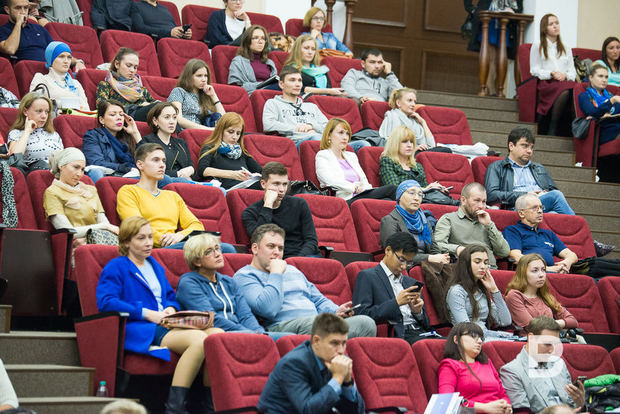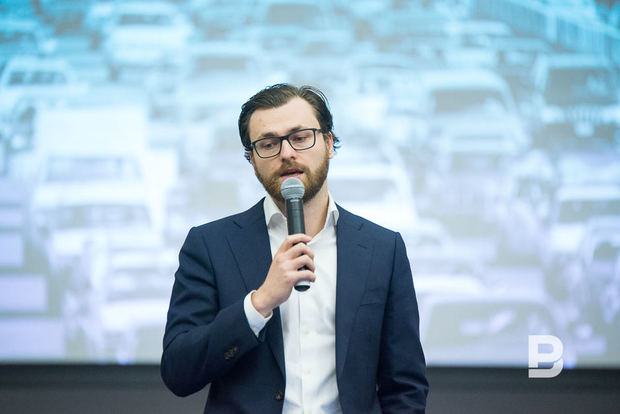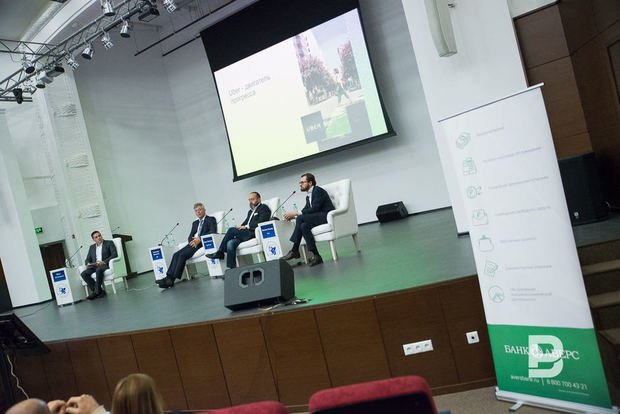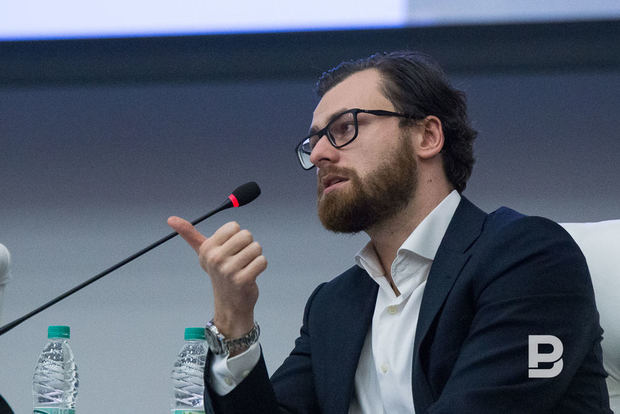Mikhail Fisher, Uber: ‘We want personal car to become an attribute like a horse’
Uber thinks our future lies with unmanned cars and taxis that will be cheaper than public transport and much cheaper than having a personal car. On the open lecture called Business in the Era of Disruptive Innovations, the Regional Development Director at Uber Russia Mikhail Fisher told why personal car became obsolete like a horse, how shared trips by taxi would save our time, and why all road problems will be solved by unmanned cars. Here is the script of his speech.
Personal cars don't take any more
Thank you for the invitation. I find it very interesting to deliver a speech here. Indeed, I would like to dedicate more time to maybe look to the future and talk about our vision of the future of transport and carriages, not about what Uber is and this phenomenon.
Henry Ford achieved a real revolution in the early 21 st century. He made a car a mass vehicle. He made a car available. So he completely changed our behaviour. He marvellously increased the mobility of the population. And car started to appear in every family.
A hundred of years have passed. And we see the concept of possession of a car has certain disadvantages I would like to talk about now and how we [Editor's Note: Uber] will get rid of them.
I will use very simple numbers, so that it will be understandable for everyone. Personal car is really used for 4% of our time on average. It is stationary for 96% of our time. It is either parked near our house or office, or you are on holiday or became ill, etc. Car seems to be the least utilised asset that humankind has at the moment. It creates problems, of course. We have too many cars because we don't know to use them effectively.
15 per cent. We use about 15% of the urban space to store this huge amount of cars. The 15% of the urban space that could be used for parks, public squares, kindergartens, hospitals and so on are used to store automobiles.

Car seems to be the least utilised asset that humankind has at the moment. It creates problems, of course. We have too many cars because we don't know to use them effectively.
A person spends 10 hours at the wheel [per week in Great Britain]. As one can't do other things at the wheel because it is dangerous, the person, in fact, loses this time, though it could be used to send these emails, read interesting things.
12% is the volume of car exhaust fumes or, to be more precise, harmful emissions into the atmosphere. And 30% is also a surprising number that I have discovered recently: it turns out 1/3 of all traffic jams are created just because car owners look for parking spaces. You have probably seen it: when a car starts to slow down and tries to park.
Personal car became obsolete like a horse
Let's speak about the future of logistics and our vision of the problem in the future. There are several ideas we consider a breakthrough that will certainly change our vision of a car and the way we move.
First of all, I will say our goal as a company sounds very simple: more people in a fewer amount of cars. We want to create such a transport system and reduce the price of this service, so that any person will have no reason for having a personal car, it would be too expensive, compared to Uber, personal cars would be used by either 'fans' or lovers only.
Roughly speaking, we want personal car to become an attribute like a horse.
Horses used to be used in the past to carry people or transport goods. Now people who do like this ride have horses.

We want personal car to become an attribute like a horse. Horses used to be used in the past to carry people or transport goods. Now people who do like this ride have horses.
Taxi for fellow travellers
The first thing we thought about is called uberPOOL. What did we say? We saw that in a big city there are several people who want to go from one point to another one at about the same time. They don't use one car just because they don't know each other.
We decided to facilitate the union of passengers through our system, so that a car will be used to get a maximum effect.
What happens in reality? You are a passenger. You want to go from point A to point B. You click 'I want to go from this point to this point'. You will be given a car. It arrives. You get into the car. While it is on its way, the system is monitoring who wants to go from point C to point D. And these points coincide with your route at least 50%, so that your routes will intersect.
If the system finds such a person, your trips match. That is to say, another person gets into the car at a certain moment. And you go together for some time till your destination. You have reached your destination. And the system is looking for a third passenger at the same time. Carrying the second passenger, the system is looking for a third one in order to match their routes.
So what do we get in the end? For a passenger, it is a significant reduction of the price. If the route coincides 100%, the price for the trip falls twofold. Consequently, if the route coincides 50%, the price makes up ¼ of the sum.
For the driver, in turn, everything is perfect. There will be a big constant trip. In other words, any kilometre and any minute he drives are really paid.
Drivers don't have miles and kilometres travelled. Drivers don't have pauses and so on. So we can provide a driver with a good salary and reduce the price [of carriages] because he or she uses it to the max.

Unavailability of public transport in certain places is one of its problems. Services that solve these problems help. The third problem of public transport is that it is not always available.
Like Lenin told – share
It is almost what we want to see. If now 1,5 people are in a car, we want 3-4 people to be in. So we want to get rid of a certain number of cars on the road.
We calculated that approximately one uberPOOL car allows to get rid of seven personal cars because its efficiency increases 8 times. What is more, we see that personal car appeared also because the existing transport structure (public transport) is not always and not everywhere possible. It is not effective that personal cars are used for that purpose at the moment. We want to change it. Shared and not personal cars should be used.
Unavailability of the existing urban infrastructure and urban public transport is a problem. Urban transport is wonderful. But metro won't deliver you from one door to another. Consequently, you will have to reach your door from a bus stop.
Such services as Uber come in handy here. About 10% of trips, oh, no, I'm lying, almost one half of trips in London starts and ends within 200 metres of a metro station.
Unavailability of public transport in certain places is one of its problems. Services that solve these problems help. The third problem of public transport is that it is not always available. It doesn't work 24 hours per day, unfortunately. According to our data, actually, we see a huge number of trips in our system takes place when public transport stops its work.

A system of mutually communicating automated cars that will allow to increase our life considerably, in fact. It will enable to return us the urban space that we are using ineffectively, return our time we are spending in traffic jams, return us pure air and make the world better.
Smart unmanned taxis
And probably the last thing we consider a breakthrough that will make a revolution and change our vision of the movement. It has been launched now in Pittsburgh.
I mean unmanned cars. The cars that deliver you from point A to point B without hiring a driver.
The thing is that about 70% of the price are the money we pay in order to provide drivers with a good salary. We have already launched it in Pittsburgh. The technology exists. We are testing it. 50 cars are used now in Pittsburgh without a man.
In other words, you order a car with the same app. Such a car arrives [he meant a car on the slide of his presentation]. You take your seat and push 'I need to go there',' and it takes you.
It is what will allow us to reduce the price of carriage. As I have said, about 70%. Indeed, it will make such services so available that it won't be necessary to have a personal car. Moreover, we will get rid of a big number of cars. And there are many-many other externalities. First of all, we will get rid of traffic jams.
For example, do you know why we have traffic jams? If you have seen when traffic light switches from red to green, the first car starts first. Then the second car follows it with some delay, then the third, etc. It is inefficient. If all the cars pressed the gas pedal equally when green was on, there would be much efficiency.
It is possible only when we have a system of mutually communicating automated cars that will allow to increase our life considerably, in fact. It will enable to return the urban space to us that we are using ineffectively, return our time we are spending in traffic jams, return pure air to us and make the world better.